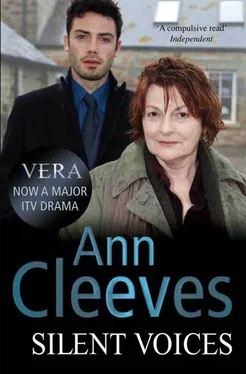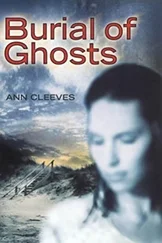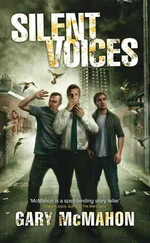‘I’m not really hungry.’ Hannah looked at her with blurred, unfocused eyes.
‘Well, I am, and your mam will have taught you it’s rude to sit and watch a person eat.’
Hannah got up from the rocking chair and joined Vera. She sat with her elbows on the table as Vera ladled soup into a bowl. It smelled delicious – of tomato and basil – and, despite herself, the girl dipped in her spoon and reached out to break off a piece of bread.
Vera waited until the soup had gone before she started talking.
‘Did you know your mother went to visit Mattie Jones in prison?’
Hannah looked a bit brighter now, sharper. ‘She didn’t talk much about her work.’
‘Mattie Jones is the young woman who killed her child. You’d have seen about it on the news. It was a big case. Your mother didn’t mention it at the time?’
A pause. ‘I do remember. It was one of the few times I’d seen Mum get angry. She got up and switched off the television. She said she couldn’t stand the way the media demonized the people involved – Mattie and the social worker. The reporters made everything seem so simple, and this case wasn’t simple at all.’ Hannah shut her eyes and there was a little smile. Vera could tell in that moment that her mother had become alive for her again.
‘Did Jenny ever talk about a book she was writing?’
Hannah smiled again. ‘She was always talking about her book, but I don’t think she’d started writing it.’
‘What do you mean?’ Not wanting to put the girl under pressure, not wanting to give away how important the answer might be, Vera raised herself to her feet and filled the kettle.
‘It was her dream. To be a writer.’
‘You mean stories, and that?’ Still with her back to Hannah, Vera dropped teabags into mugs.
‘No! She said she’d never be any good at fiction. She wanted to do a sort of popular guide to social work. Real cases – the individuals disguised of course – to bring it alive for the reader. So people could understand the strains and the dilemmas that social workers face.’
Vera set a mug of tea in front of Hannah, ferreted in a tin for a couple of biscuits.
‘I think she started writing it,’ Vera said. ‘Researching it anyway. Are you sure she didn’t work on it at home?’
‘Not sure, no. We both led our own lives. She spent quite a lot of time working here on her laptop. Maybe she wanted to start her book in secret. You know what it’s like when you talk about your dreams. People have expectations, put the pressure on. I can imagine her completing it, even waiting before she got a deal with the publisher before telling me. Then it would be: Ta-da, look what I’ve done! And a bottle of fizz to celebrate.’ Hannah looked up, her eyes as feverish as Mattie’s had been. ‘But now it’ll never happen, will it?’
‘Would she have written it straight onto the laptop?’ Because there was no record of any document of that kind saved. The techies had already been through the material on the computer.
‘No, probably not. She was a great one for longhand. She still wrote letters! Real ones, every Christmas, to all her friends and the ageing aunts. It was one of the pieces of advice she gave me about essays at school: Anything tricky, write it out first. There’s a direct
line between the brain and the pen. It never worked for me, but it would have done for her.’
‘So we’re looking for a notebook somewhere.’ Vera was talking to herself more than the girl, but Hannah answered.
‘Yeah! A4, hardback. She bought them from an old-fashioned stationer’s in Hexham. Used them all the time for work. Why? Is it important?’
It could help us find out who killed your mother. But Vera didn’t say that. She just smiled and made more tea.
‘Did Holly ask you about your mam’s handbag?’ They were still sitting at the table, the teapot between them.
‘I don’t think so.’
Of course not. Anger and satisfaction mixed. She’d have an excuse for bollocking Holly when they next met.
‘We haven’t found it yet,’ Vera said, ‘and it could be important. Could you describe it to me? And did she use a briefcase?’
‘It was big enough for her to get all her files in, so she didn’t need a briefcase.’ Hannah gave a sudden smile. ‘She loved it. It was made of soft, red leather.’
‘These notebooks you’re talking about, she’d have carried them in the bag too?’
‘Probably.’ Hannah was losing interest now. She was staring out of the window. ‘Do you think Simon will be back soon?’ As if the boy could somehow save her from her sadness, as if he was the only person who could.
Joe Ashworth thought it was all very well for Vera to give her orders, but prising Holly from the Lister house hadn’t been easy. In the end there’d been a compromise: she said she’d go as soon as the family liaison officer turned up in the afternoon. Which meant that in the morning he was on his own in Barnard Bridge and, while Vera had said someone would know about Jenny’s lover, tracking that person down hadn’t proved easy either. Ashworth had grown up in one of the pit villages in south-east Northumberland – though there hadn’t been many pits left even when he was a small child. It was the sort of place where kids played in the streets and their mams sat on the doorsteps, watching them and gossiping. He had no problem digging out secrets on his old stomping ground. Vera said he was like a magician, that he could conjure confidences from thin air. But there was no magic to it. He’d wander into the nearest social club, slip into the dialect that marked him out as one of their own, and soon the barmaid would be telling him what he wanted to know. Or directing him to someone who could help. Everyone liked telling stories, and Joe was a good listener.
This place was different. He arrived just before nine, thinking that he might catch the young mothers as they dropped their bairns off at school, forgetting of course that there was no longer a school in the village. It had been converted into a swanky house, two big cars parked where once the playground had been. There was the playgroup that Connie Masters’s daughter attended, but that only ran for three days a week. He looked at the notice outside the village hall. Not today. The main street was empty of pedestrians, though there was a steady stream of traffic and the vibrations of the lorries seemed to churn in his head and stopped him thinking clearly. The baby had woken a couple of times in the night and the lack of sleep didn’t help.
In the post office, which served also as a shop, a couple of pensioners queued at the counter. He waited until they’d paid their bills and one had sent his letter to a grown-up child in Australia, before chatting to them. Two elderly men who’d lived in the village all their lives.
‘But it’s not the same, you knaa. One time I’d be able to tell you the name of every man, woman and child in the parish. Now half the houses have people I’ve never seen.’
Ashworth felt his confidence return. Ex-collier or ex-farm labourer, folk were all the same. One of the men lived next door to Jenny Lister. He’d already talked to a police officer, he said shyly, when prompted by his friend. They’d called on everyone in the street the day before. A nice enough lad, but you could tell he was in a hurry. They’d invited him in for tea, but he’d not had the time.
‘Well, I have all the time in the world,’ Ashworth said. ‘And I could murder a cup of coffee.’
The men looked at each other and Ashworth sensed a problem. They didn’t want to be inhospitable, but neither felt they could invite him home. Cuthbert lived well out of the village, and Maurice had been banished for the morning so that his wife could clean and bake in peace. She’d be embarrassed if he turned up with a stranger when she wasn’t prepared for visitors. They had adjoining allotments and had planned to spend their time there. Ashworth thought they’d probably had adjoining desks at school. Cuthbert and Maurice. Cuthbert the talker, the leader. He’d made it to farm manager on one of the big estates, still lived in a tied cottage. Maurice was quieter and spoke with a bit of a stutter. His left arm didn’t seem to work so well. He was the Listers’ neighbour.
Читать дальше












